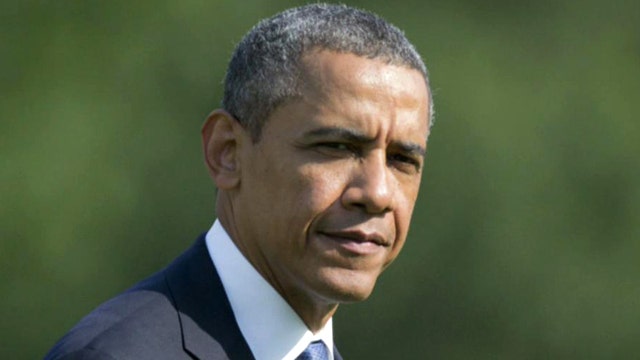Obama condemns Egypt violence, says people 'deserve better'
President delivers statement on rising chaos
As Egypt descends into chaos, President Obama is facing increasing criticism that an "incoherent" policy toward the country -- much like U.S. policy toward Syria -- is putting U.S. money and influence on the line without a clear end-game.
The Obama administration claims to be staying neutral in the violent confrontation between the military-backed government and Muslim Brotherhood supporters of ousted President Mohammed Morsi. More than 600 people have been killed so far across the country.
"America cannot determine the future of Egypt," Obama said Thursday, in brief remarks from Martha's Vineyard, where he's vacationing, as he appealed for calm and condemned the violence.
Yet the administration is sending mixed signals. While the president directly spoke out against the military-backed government on Thursday -- and canceled upcoming joint military exercises -- the U.S. has refused to label Morsi's ouster a coup. That means, under U.S. law, the administration can continue to send $1.5 billion in annual aid to the Egyptian government.
Daily politics news delivered to your inbox: sign up for our newsletter
The mixed signals raise concern that the U.S. is simply breeding distrust on both sides.
The argument in favor of aid is that it helps secure U.S. influence in Cairo, which is critical not only to Mideast stability but also the security of U.S. ally Israel. Yet the crackdown this week showed U.S. influence with the Egyptian military is waning, analysts warned. A wave of phone calls from top administration officials to their counterparts in Cairo, as well as an unconventional delegation of U.S. lawmakers to the country, did not quell the unrest.
"While President Obama 'condemns the violence in Egypt,' his administration continues to send billions of taxpayer dollars to help pay for it," Sen. Rand Paul, R-Ky., said in a statement on Thursday.
John Bolton, former U.S. ambassador to the U.N. under the George W. Bush administration, called the current policy "completely incoherent."
"You can't have your press secretary say ... that this is up for Egyptians to answer, and then try and get in the middle of it," Bolton said.
Security analysts, diplomats and editorial pages across the country are deeply divided over whether Obama should throw U.S. weight behind the military or the protesters, or stay out entirely. Few, though, are praising the administration for its current policy.
Bolton said the wisest thing for the president to do would be to not say much at all. He claimed that the reality for the U.S. is that the best option is for the Egyptian military to stay in control, "ugly as it may be." The Muslim Brotherhood, he said, is an "armed militia" and not a political party.
But he said the United States' fuzzy policy only tells the current government "we're irrelevant."
Others say the U.S. should take a stand by declaring the overthrow a coup and/or suspending aid.
"I think we may have to (suspend aid) as a short-term measure now," the Brookings Institution's Michael O'Hanlon told Fox News, likening the crackdown to Tiananmen Square.
The Washington Post published a blistering editorial on Thursday, accusing the administration of being "complicit" in the interim government's crackdown.
Dalibor Rohac, a policy analyst with the Cato Institute, told FoxNews.com that the "equivocating" over whether to call the overthrow a coup is "truly embarrassing."
He said it's evident the U.S. has "no leverage," and "the fact is we are taking sides by sending them this aid money."
Barak Barfi, a research fellow at The New America Foundation, said a big problem is the amount of aid the U.S. sends simply isn't enough to buy that much influence anymore.
"A billion dollars does not buy as much as it could in 1980," he told Fox News. Yet, Barfi said, if the U.S. suspends the aid, the move would be used by the generals to stoke an anti-foreign backlash and consolidate support for itself.
The U.S. has struggled to articulate its position as the situation became increasingly dire in the aftermath of Morsi's ouster. Pressed earlier this month by a reporter to explain the U.S. stance on whether the ouster was a coup, State Department spokeswoman Jen Psaki said: "There was a determination made that we (do) not need to make a designation."
The chaos has raised broader and more troubling questions about the impact of the so-called Arab Spring, which the Obama administration has touted. The overthrow of Hosni Mubarak was arguably the most significant transition to come out of the 2011 sea change in the Middle East. But the country is now caught between an Islamist movement with questionable credentials on democracy and a military-backed government that is flirting with the tactics of the Mubarak reign.
In nearby Syria, a civil war has engulfed the country amid modest U.S. steps to aid the opposition. And in Libya, militants attacked the U.S. compound in Benghazi last fall despite U.S. military support for the overthrow of Muammar Qaddafi.
Obama, speaking in Martha's Vineyard, acknowledged that he's being accused of supporting both sides in Egypt, but urged Egyptians to focus on righting their own problems.
"I know it's tempting inside of Egypt to blame the United States or the West or some other outside actor for what's gone wrong. We've been blamed by supporters of Morsi. We've been blamed by the other side as if we are supporters of Morsi," he said. "That kind of approach will do nothing to help Egyptians achieve the future that they deserve."
FoxNews.com's Judson Berger contributed to this report.





